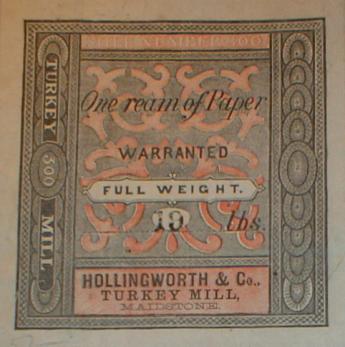Extremely Rare Turkey Mill Ream Wrapper Surfaces

By Stephen J. Gertz
A scarce ream wrapper, c. 1830s, from the historic English Turkey Mill, a major British papermaker with roots dating to the seventeenth century, has come to market.
Beginning as a cloth fuller, by the early eighteenth century the Turkey Mill had wholly converted to making paper. In 1740 James Whatman assumed tenancy of the mill, enlarged it, and, assisted by famed British printer, John Baskerville, developed a new form of fine quality paper suitable for a greatly expanded range of printing and art work; the paper became the sought-after choice of artists such as J.M.W. Turner and Thomas Gainsborough.
The development of this wove paper, produced on mesh material pioneered by Whatman, resulted in a product having a much less irregular surface than laid paper, which dramatically improved the quality of printed work and the range of possible printing techniques. Traditional laid paper caused ink and pigments to puddle on the page but wove paper's smooth surface prevented that from occurring and in addition was soaked in a gelatin bath to make it extremely strong and less absorbent. Paint moved easily over its surface and multiple layers could be applied and then wiped, scratched, or scraped away without damaging the paper.
By its introduction of wove paper (aka velin), in concert with the cessation of imports of fine note paper imports from Europe during the war between France and Spain, the Turkey Mill's success was assured; by 1759 it had assumed the major role in British papermaking and had become the largest paper mill in the country.
The Turkey Mill continued to innovate, producing the famed "Antiquarian" paper, 51 x 31 inches, at the time the largest paper size ever manufactured, requiring eleven men to operate the contrivance necessary to make a sheet.
The Hollingworth brothers acquired the mill from James Whatman II in 1805 yet the Whatman name, so associated with fine art paper, continued to be used. Rare booksellers, collectors and librarians will have no doubt seen the dated watermark "J. Whatman" on paper used to produce engravings for color-plate books published by Ackermann and many others during the nineteenth century.
All vintage ream wrappers are rare; those from the Turkey Mill are seldom seen. Alastor Rare Books in the U.K. is offering this wrapper; inquiries may be made here.
Literature
The three volume James Whatman the Elder and The Whatmans and Wove Paper (West Farleigh: J.N. Balston, 1992-1998) by John Balston is the key reference to its subject.
Of related interest
>>> The Art of Old Ream Wrappers, Unwrapped (Booktryst, November 30, 2010)
>>> Ream Wrappers at the American Antiquarian Society
The article was posted by Stephen J. Gertz on Booktryst (January 18, 2011), and is presented here by permission of the author. Thank you very much.
>>> Booktryst
